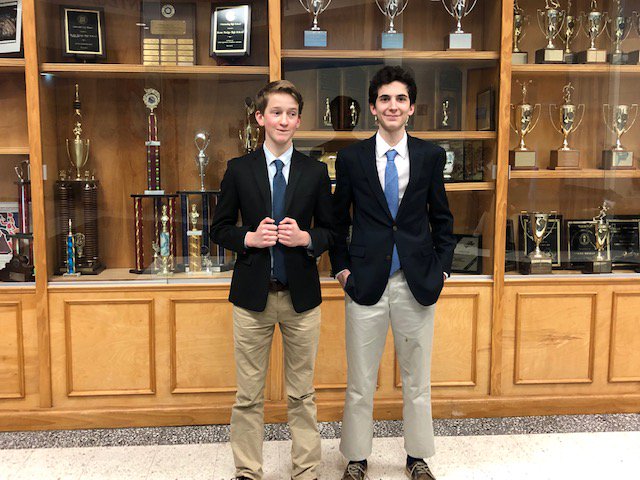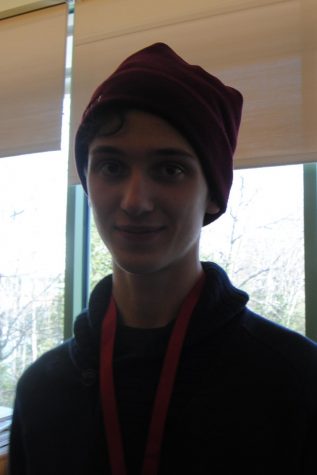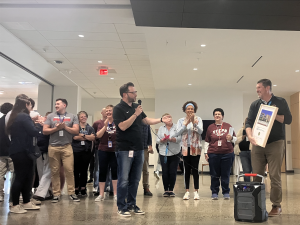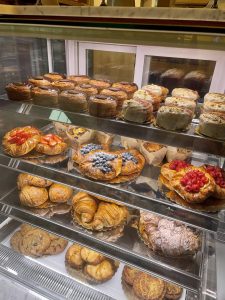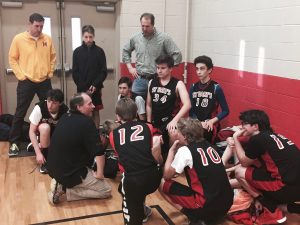Speech and Debate: cultivating a lifelong skill
Photo via Mason Athletics Twitter
Charlie Adams (left) and Evan Lankford (right) of the George Mason Speech and Debate team recently qualified for Metro-Finals. They will be competing together this weekend at the “JV” level in the Public Forum event (Photo via Mason Athletics Twitter)
March 8, 2019
“Wait, what’s the rebuttal to the patent law contention for Con?”
It was around 6:30 AM on a Saturday morning, and instead of sleeping in, I was huddled in the back of a freezing FCCPS van, flipping through pages of research on pharmaceutical price controls.
Sophomore and JV debater Evan Lankford was peppering me with last-minute questions as we approached our destination, a small high school in the outskirts of suburban Virginia.
The event was the culmination of several days of intensive research, and at least one sleepless night, on a subject we knew nearly nothing about a week ago. Nevertheless, by the time the competition rolled around, we could each rattle off quotes from government agencies, statistics from research papers, and arguments from policy think tanks in the field of healthcare.
The Speech and Debate Team is one of the smaller competitive organizations at George Mason High School. But despite consisting of fewer than nine active members at a given time, Mason has won awards in speech and Public Forum at a competition called Metro-Finals. This weekend, two sophomores- Charlie Adams and Evan Lankford- will attend the selective competition.
While the Debate Team now holds its own at regional and state competitions, it had humble beginnings.
“When I was a freshman, the team was still very fledgling,” said senior and Public Forum alum, Bella Hubble. She and her partner, Katie Smith, “were both very active in helping recruit and train new members.” They also “spoke in front of the Falls Church City School Board about the importance of the debate at George Mason and to get them to better fund the team.”
Early competitions were also a struggle.
“When I was a freshman on Debate, I found the sport very intimidating because I was immediately thrown into a very fast-paced community that used a lot of jargon I was unfamiliar with,” said Hubble. “Saying my first tournament was rough is an understatement.”
However, amidst the challenges, there were upsides as well.
“I was surrounded by a lot of seasoned debaters and getting to work with them really helped me grow my research and speaking skills,” said Hubble. “While I was confused most of the time, I still found a home and community with the people on my team, and I loved the team. I was super nervous and very underprepared, but I needed to throw myself in at some point.”
Hubble would go on to secure multiple victories at Metro-Finals, and captain the team for two years.
The team owes some of its success to its new coach, Colin Dailey, who taught debate at George Mason University before assuming his current role at George Mason High School. Dailey, who provides team members with interactive lessons on debate techniques and extensive topic briefings for each competition, is excited about the 2019 season.
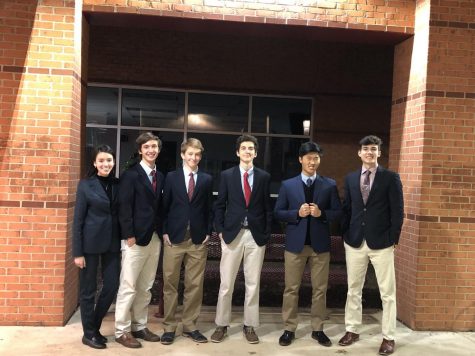
“We just had a JV team qualify for Metro-Finals,” said Dailey. “That makes me very hopeful overall. Everyone seems to be motivated, does their own case writing, and seems to be putting their best foot forward.”
Students considering joining the Debate Team should know that it is a significant investment of time, and Saturday mornings. However, it is also a great way to acquire essential skills that can be applied in college and the workplace.
“Debate prioritizes good communication and the actual use of logic as opposed to emotional appeals,” said Daily. “That’s why competitors are judged by experts. It is a great way to learn how to formulate and justify ideas in a professional environment.”
Dailey also suggested that debate team is a great way to explore ideas outside the comfort of personal ideology.
“The process of participating in debate and having to research and debate both sides of issues challenges people’s preconceived notions because when you are forced to research something you are forced to come to different conclusions.”



